#this is a bit truncated but i couldnt bring myself to make this longer
Text
The metanarrative’s grand narrative: Osomatsu-san’s characterization throughout the franchise
The growing cynicism throughout the entire Osomatsu-san franchise shows itself in season 3 with more prominence than anything prior. I think that’s pretty common amongst any “long-running” gag comedy - replacing a plot with spiteful commentary that’s admittedly pretty hit or miss at times. However, it invariably creates a negative but pretty funny character growth, and I love the way the show (I’m including the movie too as “canon” material considering season 3 has referenced it way too many times for me to disregard) has set up this metanarrative across seasons. Long post ahead.
Obviously, Osomatsu-san is self-aware and has a casual relationship with itself. No linear plot (though S3 seems to be trying it out and I’ve enjoyed it - I love that they’re willing to experiment), rather a collection of unrelated skits; and so it points out its own metanarrative because of this “lack of consequences.” With comedy comes impermancy and Ososan AND -kun will always bounce back from that week’s insanity. From the Oxford Dictionary, a metanarrative is “a narrative account that experiments with or explores the idea of storytelling, often by drawing attention to its own artificiality.” Basically: a story about stories.
On top of this, is what I’m calling the “grand narrative,” which is often used interchangeably with metanarrative, but here I’m making a distinction to make it less confusing. Of course, Ososan is a story about stories, but with that comes a story it’s not directly telling, which is where most of the (little) character development is taking place. This is what I’m going to call the grand narrative of a show whose premise is being a meta-aware comedy. I’ll admit I’m by no means an expert on these subjects, but storytelling methods are something I enjoy trying to analyze. As a media format, Ososan really utilizes the fact that it’s a tv show.
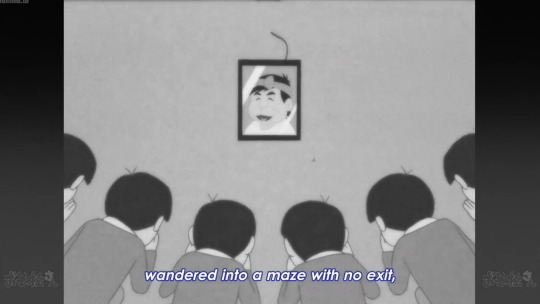
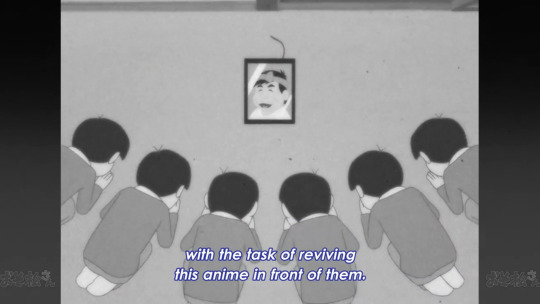
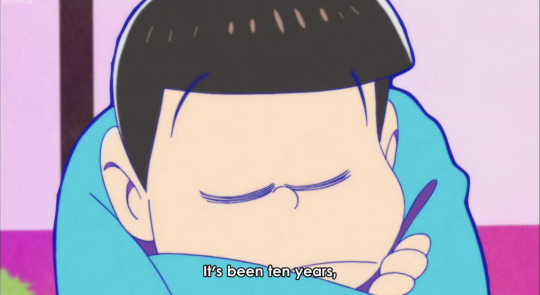
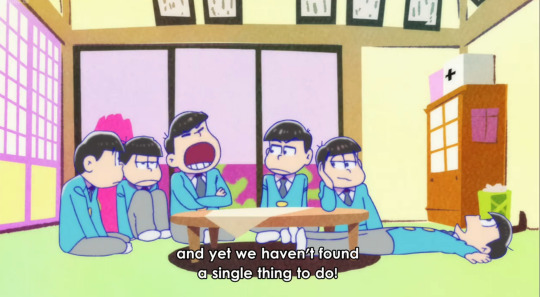
Right off the bat S1E1 makes it clear what to expect: Nothing. Not a damn thing. But, the show had already been cleared for this first season, so it has to be produced. This same episode’s preview is done by Osomatsu, which I’m just gonna quote instead screenshot because there’s too many.
“...we plan on properly starting the anime the next episode.”
“...you ended up with an extra minute, so you need me to do something to fill it?! Actually, is this anime going to be okay with episode one being like this? I’m getting worried about how the rest of this is going to be...”
“There, I used up a minute! [EPISODE ENDS]”
Episode one is not only batshit referential, but downright mocking the state of anime in 2015. Which, truthfully, I don’t have much to comment on in that regard, as I’m not an avid anime fan. However, it does this under the premise of being indecisive about what kind of anime they wanted the Osokun reboot to be.
They’ll do just about anything to stay popular and relevant considering that is, quite literally, all they have going for them as characters in the series and just being characters in general. They may be pieces of shit, but they’re likeable pieces of shit. The dynamics they’ve built upon to be entertaining is encouraged, and they’re basically just roleplaying different skits and fucking around.
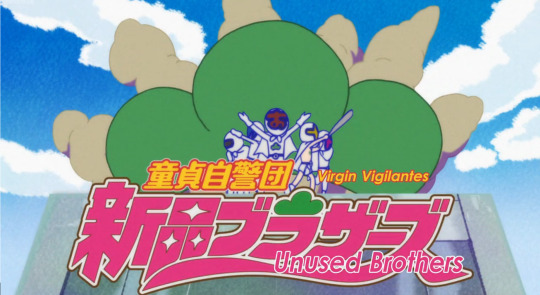
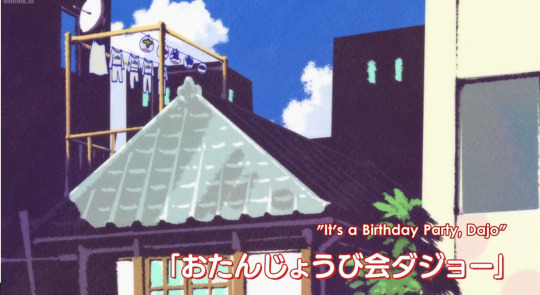
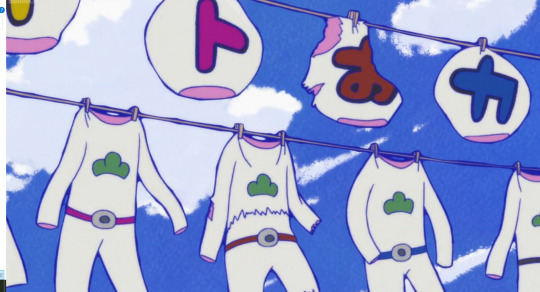
All the AUs! All the skits! They’re just playing! They’re just fuckin’ around!! They couldn’t come up with any interesting plot nor could they “graduate” from being anime protagonists and join the real world, so they just fuck around and make a gag anime!
Even if we follow both as the audience, the show makes a difference between the what’s them in their “normal life” (crazy begets crazy, no?) and what’s their “show.” But, really, that’s just one way to look at it, as they don’t really follow any rules as a show. I could say the Joshimatsus are separate characters from the sextuplets, and it’d be a “correct” interpretation. It doesn’t really matter - I’m choosing to examine it all as being the six of them just running around and playing, because being entertaining and having fun is all they know as characters. Besides, having it blended together beyond recognition reinforces how it prioritizes entertaining us, the audience, above logic. Storytelling doesn’t need to make absolute spatial-temporal sense for it to be enjoyable to fans.
In any case, that mentality really seems to be what pushes their character development negative, as they look to reinforce habits and rituals despite them being really detrimental for them in the long run. They know they’re popular characters as is, and with really everyone from staff to fans encouraging this behavior further, so they see no point in fixing what isn’t really broken.
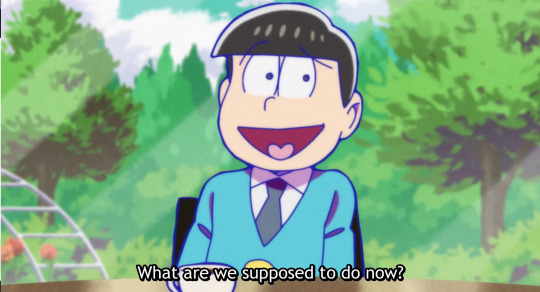

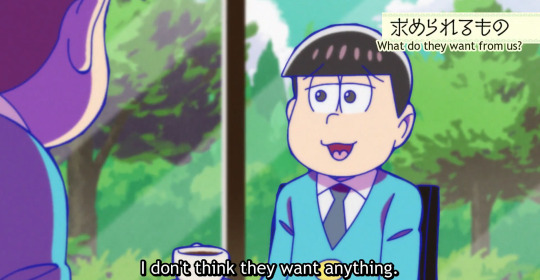
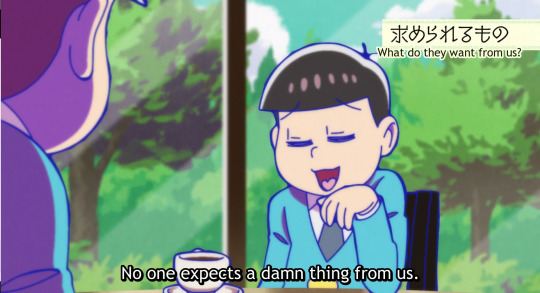
I found this 4 year old article from Manga.Tokyo discussing the Ososan phenomenon in Japan because while the craze died off pretty quickly in American anime circles (which deserves a whole other post), Japanese fans went fuckin’ nuts.
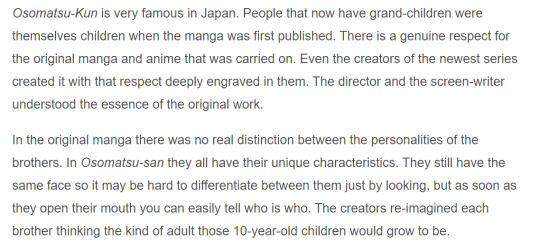
This portion caught my attention, as it makes sense that entitled and enabled asshole children would grow up to be entitled and enabled asshole adults. The article also goes on to compare them to idols (even beyond the F6 spoof) and that they are rooted in being comfort characters above all else.
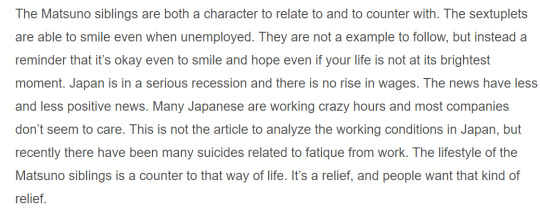
It’s worth a read, especially because Japanese fan response is what drives majority of the content post-S1, and, inevitably, ties into their character development.
They know that they’re Characters, particularly Protagonists. You know what happens to protagonists? Everything works out. Just about every single story created has stuff working out for protagonists. In fact, we have a whole genre made that separates stories with bad tragic endings from our Normal Stories. Ososan is a comedy, not a tragedy, so surely there’s gonna be some payoff somewhere along the road, especially as the seasons and other content are still being pumped out. To a self-aware, entitled, enabled protagonist, assuming everything is just gonna work out for you isn’t that far off from your narrative truth.
However, Ososan is a gag anime, and a lot of gag content (like 4koma mangas) is dropped for other projects before any emotional cathartic ending is provided for characters and fans alike. So, three seasons and a movie later, nothing has happened. It’s a great idol cash cow with a Family Guy filter, and the characters (and writers) don’t even bother to hide it anymore. And I know I’m being hypocritical concerning my definition of “canon material” but I think this portion from one of the drama cds “Choroplex” basically summarizes my point:
CHOROMATSU: Wait, don’t make this into a gag! You don’t even care about becoming employed, right?
KARAMATSU: There’s no way that could happen...
CHOROMATSU: What kind of future are you imagining? Is it nothing but this?
[HUGE PAUSE BEFORE THEY MOVE ONTO SOMETHING ELSE]
They’re parodies of themselves and are running out of ideas. Stagnation and decay is normal, if not unavoidable, at this point in time for them. They’re just 20 somethings who’ve hit a wall but they’re too scared and insecure to bring about permanent positive change. It’s easier for them to fall back into normal patterns and joke off the rest.
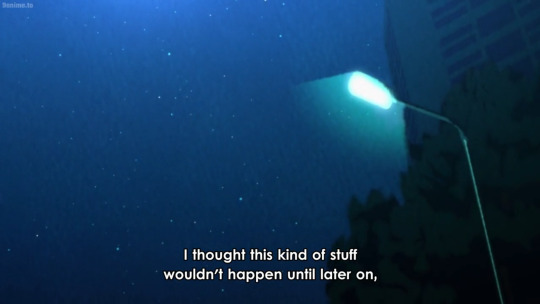
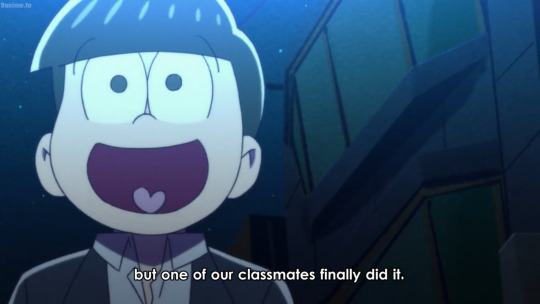
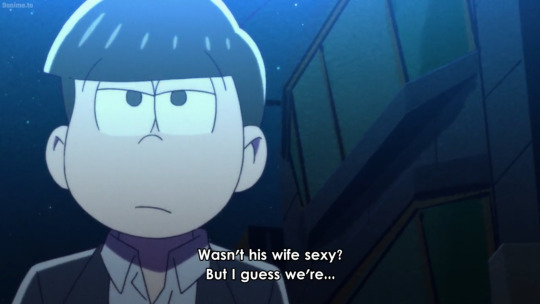
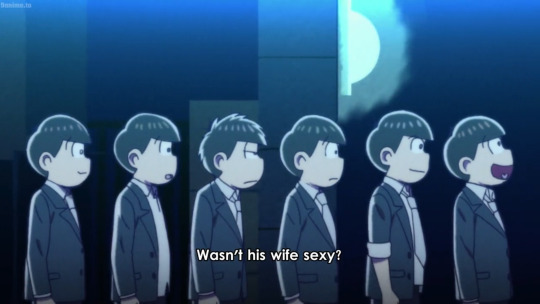
They have an antagonistic relationship with expectations. They can’t handle a single iota of expectations, or responsibilities. They’ve never needed to worry before, so why bother now? Once the biggest hits on the block, now they’re just guppies in the ocean, and there’s nothing they believe themselves to be able to accomplish to keep up with this big brave new world. This is epitomized in S3E15, where old man Osomatsu tells a bastardized version of the Tortoise and the Hare, blatantly projecting his feelings onto it. Again, too many screenshots so let me pull more quotes (bolding for my own reference):
“The place that the tortoise thought was the goal was not actually the goal. His journey down the road of life still continued on. The tortoise was quite tired, but he continued running anyway.”
“No one actually knew who was in front anymore. There are too many people above you.”
“After the tortoise found out how society worked, he thought, ‘So this is the difference in talent? No amount of hard work is going to fix this. All right. I’m done competing with others.’”
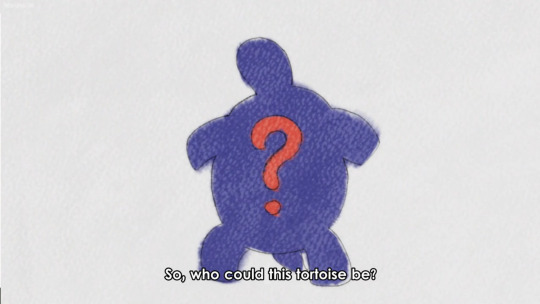
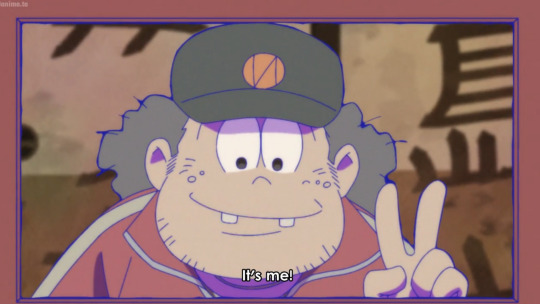
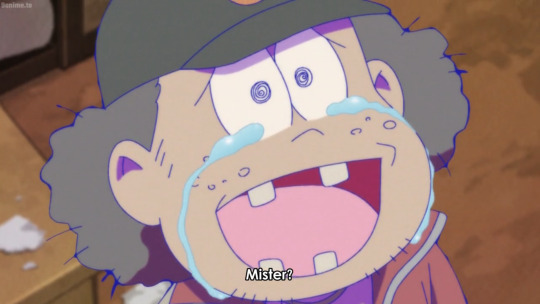
S3 has left more questionable endings than its counterparts. The last 2 skits I referenced don’t even a gag to them, and the marriage skit doesn’t play music for the entire second half of S3E5. There’s more involved too. I haven’t even brought up the rice ball twins becoming actual entertainers in their universe, or how they introduced this whole AI subplot only to reject it because All Six Of Them aren’t interested in expanding their little corner of the world. Here’s a transcript of the ending preview from S3E1:
“Hey, hey, Osomatsu here. I thought we were saved from being replaced, but I guess we get new characters next week. Man, we’re busy. New encounters, changing surroundings... We’re NEETs to begin with because all that is a pain. I guess a lot can happen after three seasons. [EPISODE ENDS]”
The sextuplets’ mindsets are extremely self-centered, which is also an environmental thing (the parents don’t even really care that they’re NEETs, for one) and an understanding of what they ought to be (epic successful protagonists). They also have a very black and white mentality, all or nothing. They’re extremely sheltered, and once they realized where they stood in society at large, they just gave up. To them the world is divided between winners and losers, and somehow, “inexplicably,” they found themselves to have fallen from grace. But they’re protagonists, that has to count for something! Everything’s gonna end up okay, right? Well... what this show has told them: No, not at all. They are consistently compared and warned of Iyami, and are perfectly aware of this fact, and have come to internalize it as a truth rather than a reversible self-fulfilling prophecy.
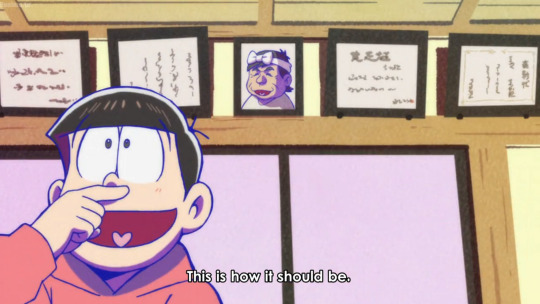
Too many screencaps, taken from the S3S5 marriage discussion:
JYUSHIMATSU: I wonder if we’re gonna get married someday, too.
CHOROMATSU: Well, I mean... probably? I’m not exactly sure, but...
TODOMATSU: What? You’re gonna get married, Choromatsu-niisan?
CHOROMATSU: Huh? Well, yeah... someday.
Surprise! They have commitment issues! The same group that couldn’t commit to a fucking plot! Though their personality issues have several factors involved, I can’t overlook the theater motifs abound. Life’s a stage, and they’re performing entirely unscripted and it shows.
Do I think all of this is 100% intentional on the writers’ part? No, probably not. There’s also an extra layer here regarding contemporary Japanese commentary that I’m not familiar with, so I just ended up focusing on the characters. I can’t be in the writers’ heads, but whatever decisions are being made by executives regarding censorship and “compliance” are reflected in these character changes that result in being significantly more bitter and defeatist.
In the all or nothing, winner-take-all mentality, the only way to save face at this point, in their minds, is to own up to it - act like it’s what they wanted all along. And, hey, it’s funny to watch, right?
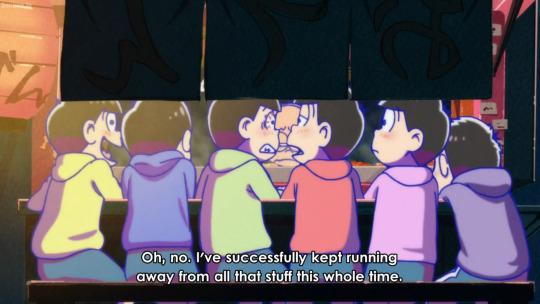
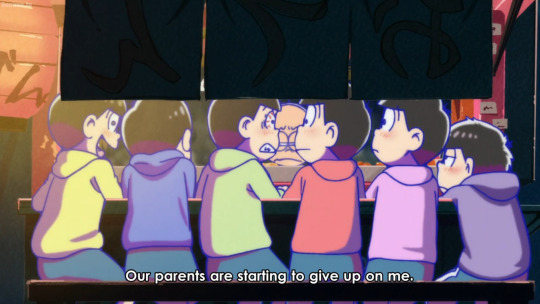
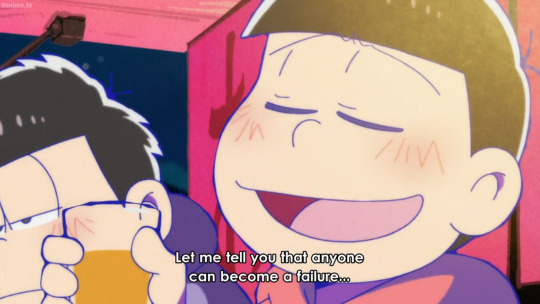
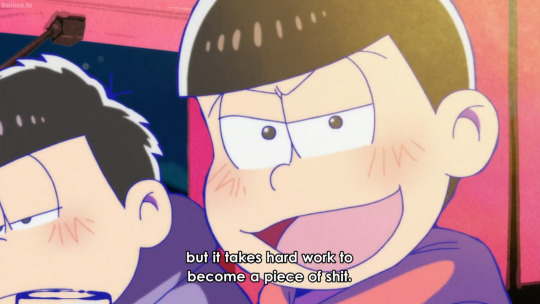
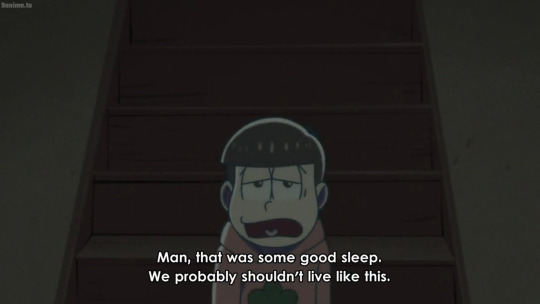
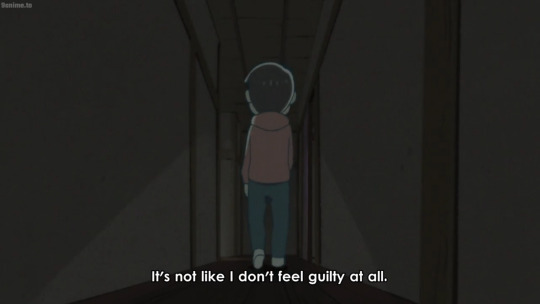
“Why is Osomatsu all my examples”, you might be asking. Well, he’s the damn blueprint for it all. The leader of the bunch, the first personality to grab your attention, has had all his issues projected and ricocheted in their echo chamber.
Ultimately, my point here is that you could think their “canon characterizations” (though canon means nothing in a show like this) as being intertwined with the nature of their self-aware existence. They’ve shown you all their tricks, the smoke and mirrors are getting boring, and they’re stalling long enough the story seems to be moving on without them - in spite of them. And when something genuinely threatens their way of life, they don’t know how to respond.
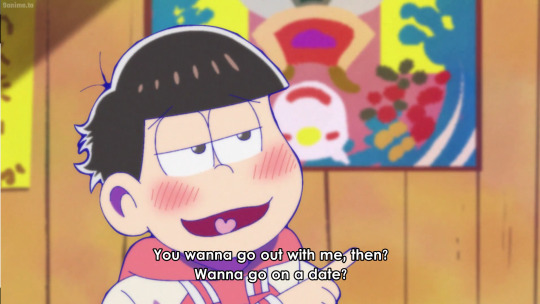
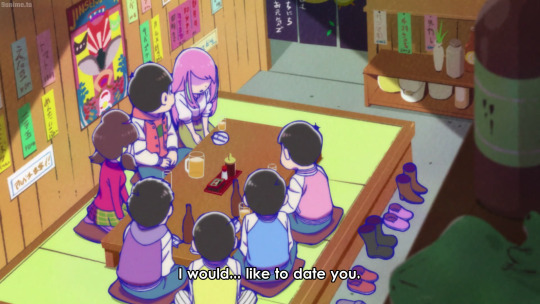
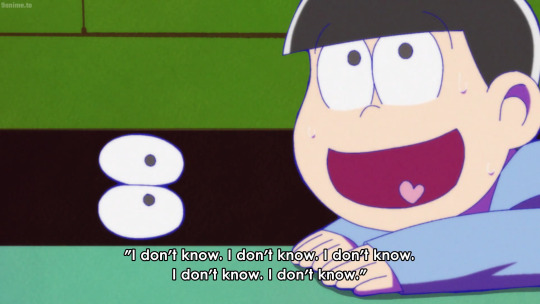
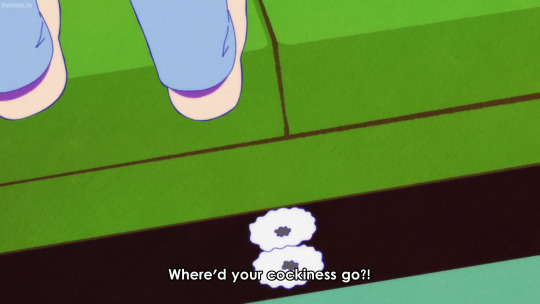
You can play it all straight, of course. Remove the meta jokes and all the same plot points can be hit, but, as a slapstick comedy, it’s able to easily add this additional layer in that I appreciate. I’ve said it in my last post and I’ll probably say it in more, but with comedy comes sincerity - the caveat of all the cartoon violence is that, on some level somewhere, this is how they really feel.
#osomatsu san#osomatsu#karamatsu#choromatsu#ichimatsu#jyushimatsu#todomatsu#osomatsu matsuno#karamatsu matsuno#choromatsu matsuno#ichimatsu matsuno#jyushimatsu matsuno#todomatsu matsuno#analysis#confession this was sparked by a convo i had w friends about s3e18#this is a bit truncated but i couldnt bring myself to make this longer#maybe ill make a pt2 or whatever idk
114 notes
·
View notes